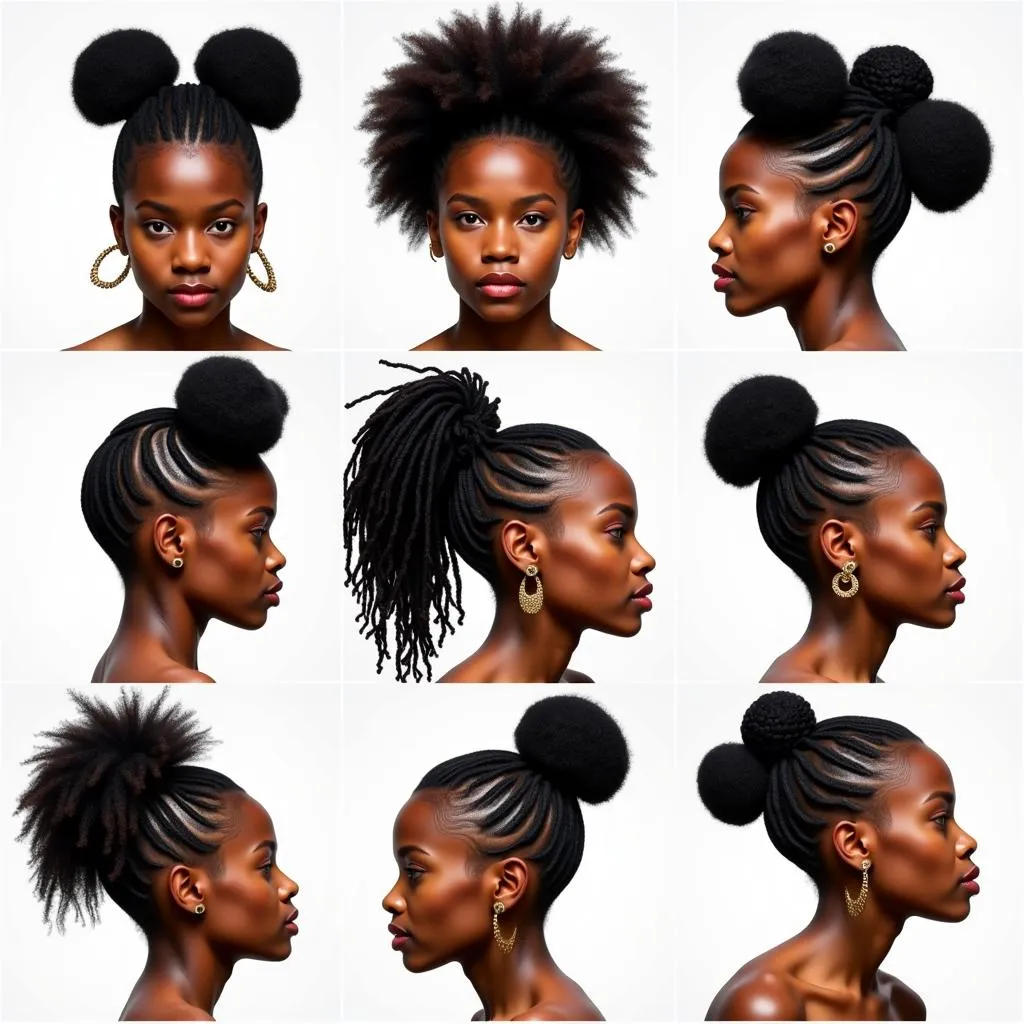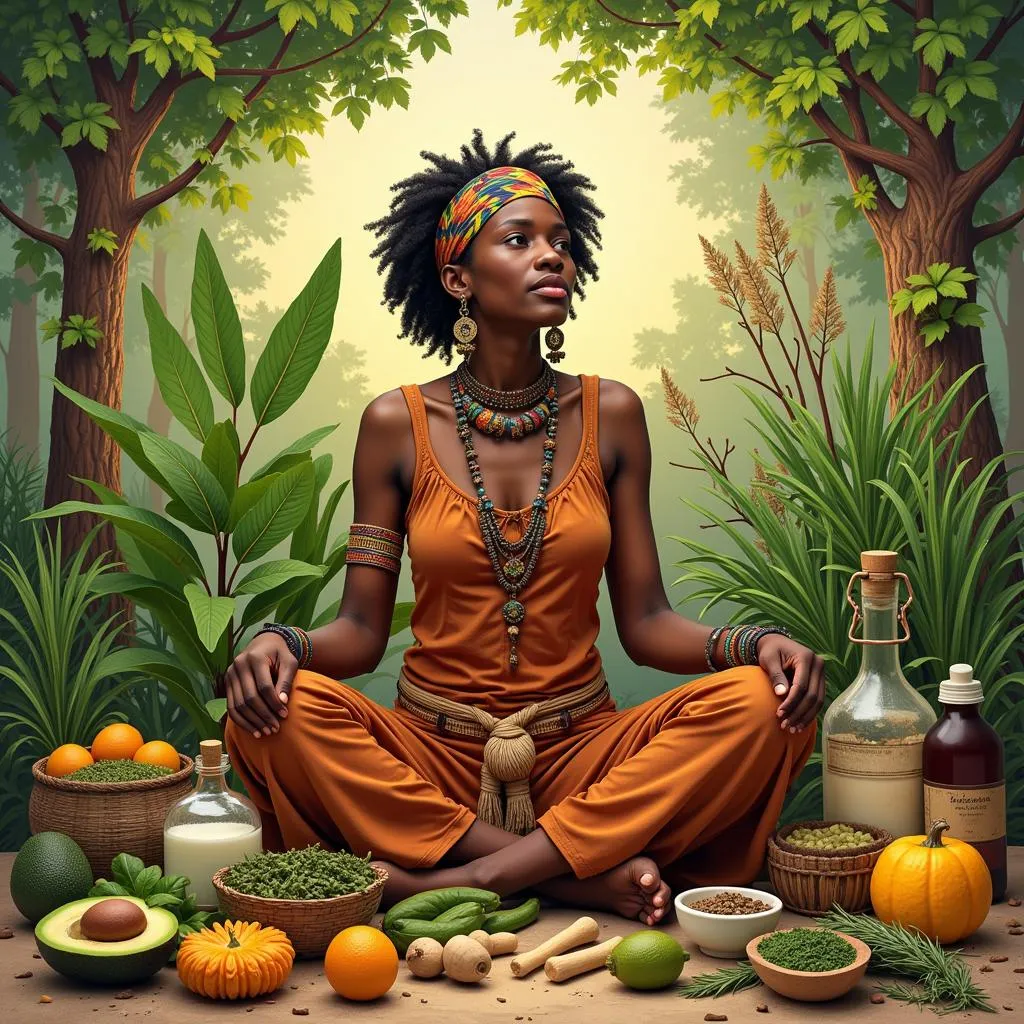African Body Specialities encompass a diverse and intriguing array of traditions, practices, and beliefs that have been passed down through generations across the continent. From intricate hairstyles and elaborate body art to unique healing techniques and spiritual rituals, these specialities offer a glimpse into the rich cultural heritage and deep connection to the human form that permeates African societies.
The Art of Adornment: Hair, Jewelry, and Body Modification
 African Hairstyles: A Reflection of Culture and Identity
African Hairstyles: A Reflection of Culture and Identity
In many African cultures, the human body is seen as a canvas for artistic expression, and adornment plays a significant role in conveying cultural identity, social status, and personal beliefs.
Hairstyles as Cultural Markers
African hairstyles are renowned for their diversity and complexity, often serving as powerful symbols of cultural heritage and social standing. From the intricate braids of the Himba people of Namibia to the elaborate cornrows of the Yoruba people of Nigeria, each hairstyle carries deep cultural significance and often reflects a person’s age, marital status, or social position within the community.
The Language of Jewelry
Jewelry serves not only as a form of adornment but also as a powerful language of communication in many African cultures. Materials such as beads, shells, and metals are carefully selected and crafted into intricate designs that convey specific meanings and messages. For instance, among the Maasai people of Kenya and Tanzania, beaded necklaces are used to indicate a woman’s age, marital status, and number of children.
Body Modification and Ritual Significance
Body modification practices, such as scarification, tattooing, and lip plates, hold deep cultural and ritual significance in various African societies. These practices often mark rites of passage, signify group affiliation, or enhance beauty standards. For example, among the Mursi people of Ethiopia, lip plates are a symbol of female beauty and social maturity.
Healing Traditions: Harnessing the Power of Nature
 Traditional African Healing: Connecting with Nature’s Remedies
Traditional African Healing: Connecting with Nature’s Remedies
African healing traditions are deeply rooted in the belief that true well-being encompasses the physical, spiritual, and emotional realms. These traditions often draw upon the power of nature, utilizing herbs, plants, and rituals to restore balance and promote healing.
The Role of Traditional Healers
Traditional healers, often revered as spiritual intermediaries, play a pivotal role in diagnosing and treating illnesses within their communities. They possess extensive knowledge of medicinal plants, spiritual practices, and traditional healing techniques that have been passed down through generations.
Herbalism: Nature’s Pharmacy
African herbalism is a vast and intricate system of knowledge that utilizes the healing properties of plants to address a wide range of ailments. From treating common colds and fevers to addressing more complex conditions, traditional healers employ a sophisticated understanding of plant synergy and dosage to create effective remedies.
Spirituality and Ritual in Healing
Spirituality and ritual are integral components of many African healing traditions. Rituals, often involving dance, music, and offerings, serve to connect with the spiritual realm, appease ancestors, or restore harmony within the individual and the community.
Cultural Beliefs and Practices: A Tapestry of Diversity
Africa is a continent of immense cultural diversity, with a rich tapestry of beliefs and practices that vary widely across regions and ethnic groups. From birth and death rituals to celebrations of harvest and ancestry, these traditions provide a framework for understanding the world and navigating the complexities of life.
Rites of Passage: Marking Life’s Transitions
Rites of passage, ceremonies that mark significant life transitions, are an integral part of many African cultures. These rituals, often involving specific trials, initiations, or symbolic acts, help individuals navigate the challenges of moving from one stage of life to the next.
Ancestor Veneration: Honoring the Past, Guiding the Present
Ancestor veneration is a prevalent belief system in many African cultures, reflecting a deep respect for the wisdom and guidance of those who came before. Offerings, prayers, and rituals are performed to honor ancestors and seek their blessings and protection.
Music and Dance: Expressions of Joy, Sorrow, and Community
Music and dance are not merely forms of entertainment but rather powerful expressions of emotion, storytelling, and community bonding in African cultures. From the rhythmic drumming and energetic dances of West Africa to the soulful melodies and intricate footwork of Southern Africa, these art forms play a vital role in cultural ceremonies, rituals, and everyday life.
Conclusion: Embracing the Richness of African Body Specialities
African body specialities offer a captivating window into the diverse cultural heritage and profound connection to the human form that permeates the continent. From the intricate hairstyles and elaborate body art to the unique healing traditions and spiritual rituals, these practices reflect a deep understanding of the interconnectedness of mind, body, and spirit. As we delve into the world of African body specialities, we gain a deeper appreciation for the beauty, wisdom, and resilience of African cultures and their enduring legacies.
FAQ
1. What is the significance of scarification in African cultures?
Scarification, the practice of creating permanent designs on the body through controlled cuts, holds diverse cultural meanings. It can signify tribal affiliation, mark rites of passage, enhance beauty standards, or serve as a form of spiritual protection.
2. How do traditional African healers diagnose illnesses?
Traditional healers employ a holistic approach to diagnosis, considering not only physical symptoms but also emotional and spiritual factors. They may use techniques such as pulse reading, dream interpretation, or divination to identify the root cause of an ailment.
3. What is the role of music in African healing ceremonies?
Music plays a vital role in many African healing ceremonies, serving to induce trance states, evoke emotions, and facilitate connection with the spiritual realm. The rhythmic patterns and vibrations of music are believed to have therapeutic effects on both the body and mind.
4. Why is ancestor veneration so important in many African cultures?
Ancestor veneration is rooted in the belief that ancestors continue to play an active role in the lives of their descendants. By honoring their ancestors, people seek guidance, protection, and blessings for the present and future.
5. Are there any similarities between African and other traditional healing systems?
Yes, many traditional healing systems around the world share common elements with African traditions, such as the use of herbs, the importance of spirituality, and the emphasis on treating the whole person rather than just the physical symptoms.
Need Assistance?
For personalized support and guidance, please don’t hesitate to reach out to us:
Phone: +255768904061
Email: [email protected]
Location: Mbarali DC Mawindi, Kangaga, Tanzania
Our dedicated team is available 24/7 to assist you with any inquiries or requests.
Leave a Reply